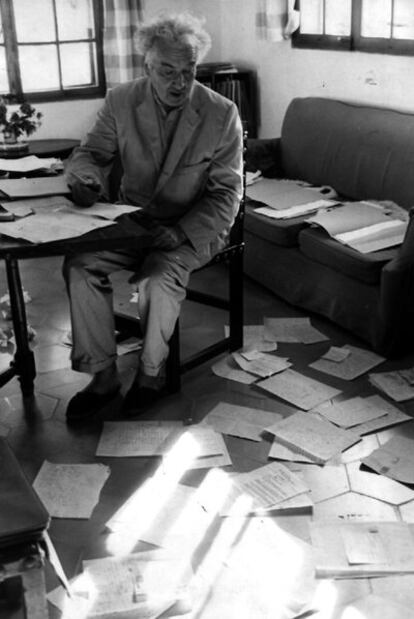Robert Graves: The Spanish connection
Complete short stories of 'I Claudius' author shed light on his life in Mallorca
Best remembered for his novelized account of the lives of the Roman emperors in I Claudius and other works, Robert Graves was also a translator, historian, publisher, essayist, poet and short-story writer throughout his 90-year life.
Now, publishers RBA have brought out the first complete collection of shorter works in Spanish, many of which are autobiographical, dealing with his early years, his experiences as a soldier in World War I, and his lengthy life as an expat in Mallorca. He lived there in the 1930s with his wife, the poet Laura Riding, returning at the end of World War II and remaining there until his death in 1985.
"The 50 or so short stories allow us to get to know him better, and also shed light on his relationship with Spain," says his daughter Lucía Graves, who has translated the collection.
"When I returned with my family shortly after the Second World War, one could still leave one's briefcase hanging from a tree, and three months later, the contents would still be intact," Robert Graves said, describing a Mallorca in the 1940s that was still untouched by tourism, and which features in some of the most engaging stories.
Graves first lived in Palma de Mallorca, where he wrote extensively about the island and its inhabitants. His works show his fondness for his island neighbors and a culture in which he became fully integrated, though never quite managing to throw off the moniker of outsider.
At the same time as he humorously portrayed the characters and customs of what was then still an inward-looking society, Graves also found ways to explore the terrible impact left by the Civil War on the island, dealing with revenge and the settling of old scores, in works such as Está en su casa, one of the rare stories whose title was originally in Spanish, and which his daughter says is her favorite.
Lucía Graves, who was born in Devon in 1943, followed in her father's footsteps as a writer, and worked with him for many years. Among the new collection are around 12 stories that have never been published in Spanish.
Graves, who left behind more than 150 works, admitted that he used the short-story form to write about himself and real life events. "Pure fiction is beyond the reach of my imagination," he said.
Most of the stories included in this collection are autobiographical, or are based on events that he witnessed or was told about. Most were written in the 1950s and early 1960s, and were published in magazines in the United States and Britain. Many of the titles evoke his early years in Victorian and Edwardian England, a society that would be shattered by World War I, and address his early love of poetry. He also wrote extensively about his experiences in the trenches.
Graves wrote his autobiography in 1929, tracing the monumental and universal loss of innocence that occurred as a result of the First World War in Goodbye to All That.
Written after the war and as he was leaving his birthplace, he thought, forever, Goodbye to All That bids farewell not only to England and his English family and friends, but also to a way of life. Graves' own life was never the same after World War I, and his experiences in the conflict marked him. On November 11, 1985, less than a month before his death, Graves was among 16 Great War poets commemorated on a slate stone unveiled in Westminster Abbey.
Graves said that he would never write "anything of autobiographical interest" again, preferring to look back on his life through his short stories.
"These stories reveal a lot about him, and his attitude to life, his way of seeing things, and his domesticity," says his daughter.

Tu suscripción se está usando en otro dispositivo
¿Quieres añadir otro usuario a tu suscripción?
Si continúas leyendo en este dispositivo, no se podrá leer en el otro.
FlechaTu suscripción se está usando en otro dispositivo y solo puedes acceder a EL PAÍS desde un dispositivo a la vez.
Si quieres compartir tu cuenta, cambia tu suscripción a la modalidad Premium, así podrás añadir otro usuario. Cada uno accederá con su propia cuenta de email, lo que os permitirá personalizar vuestra experiencia en EL PAÍS.
¿Tienes una suscripción de empresa? Accede aquí para contratar más cuentas.
En el caso de no saber quién está usando tu cuenta, te recomendamos cambiar tu contraseña aquí.
Si decides continuar compartiendo tu cuenta, este mensaje se mostrará en tu dispositivo y en el de la otra persona que está usando tu cuenta de forma indefinida, afectando a tu experiencia de lectura. Puedes consultar aquí los términos y condiciones de la suscripción digital.








































